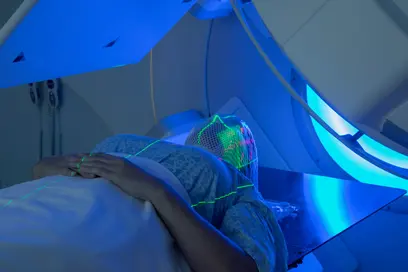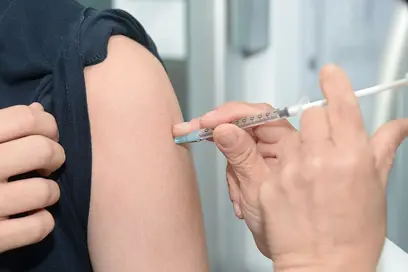Ob Krebs entsteht und sich ausbreitet, ist unter anderem abhängig von der körpereigenen Abwehrlage. Wissenschaftler einer Kooperationsgruppe der Universitäts-Frauenklinik und des Deutschen Krebsforschungszentrums in Heidelberg haben Brusttumore untersucht und zwei Botenstoffe identifiziert, die entscheidend daran beteiligt sind, Abwehrzellen gegen den Tumor zu aktivieren. Sind aktivierte Abwehrzellen nachweisbar, verbessert sich die Prognose. Die Ergebnisse wurden in der Fachzeitschrift “Cancer Research“ veröffentlicht.
Dass körpereigene Immunantworten auf Tumorzellen prinzipiell möglich sind und sich positiv auf den Verlauf von Brust- oder Darmkrebs auswirken können, ist schon länger bekannt. Im Reagenzglas sind bestimmte Immunzellen (T-Zellen), die spezifisch gegen den Tumor gerichtet sind, sogar in der Lage, Tumorzellen komplett zu vernichten. Bisher ist jedoch noch nicht erforscht, unter welchen Umständen es dem Körper gelingt, aktive tumorspezifische T-Zellen zu bilden, und wie diese den weiteren Krankheitsverlauf mitbestimmen.
Tumorspezifische T-Zellen verbessern die Prognose
Die Wissenschaftler um Dr. Christoph Domschke und Dr. Florian Schütz (Universitäts-Frauenklinik, Heidelberg) sowie Privatdozent Dr. Philipp Beckhove, Leiter der Arbeitsgruppe Translationale Immunologie am Deutschen Krebsforschungszentrum, haben 207 Brustkrebspatientinnen untersucht und festgestellt, dass die Erkrankung günstiger verläuft und mit einem geringeren Sterblichkeitsrisiko einhergeht, wenn tumorspezifische T-Zellen im Knochenmark vorhanden sind. Die Aktivierung dieser Zellen ist jedoch von vielen Faktoren abhängig.
Botenstoffe beeinflussen Immunantwort
Die Wissenschaftler untersuchten in Brustkrebsproben den Gehalt an 27 verschiedenen Immunbotenstoffen (Zytokinen) und Wachstumsfaktoren. “Insbesondere konnten wir nachweisen, dass die Zusammensetzung der Botenstoffe im Tumor entscheidend ist für eine funktionierende Abwehrreaktion im Knochenmark“, sagt Dr. Christoph Domschke. Bevor das Knochenmark Abwehrzellen bilden kann, müssen ihm sogenannte dendritische Zellen mitteilen, dass im Körper Krebszellen vorhanden sind und welches spezifische Merkmal sie haben. “Diese dendritischen Zellen leiten jedoch nur dann eine schlagkräftige Immunabwehr ein, wenn das Tumorgewebe eine spezifische Zusammensetzung an Zytokinen aufweist. Erforderlich sind hohe Konzentrationen an Interferon alpha (IFNa) und gleichzeitig geringen Konzentrationen an Transforming Growth Factor beta1 (TGFß1)“, so Domschke.
“Unsere Ergebnisse sprechen für die Bedeutung einer funktionierenden Immunantwort für die Prognose einer Brustkrebserkrankung“, erklärt Studienleiter Philipp Beckhove. Bei der Planung zukünftiger individualisierter Immuntherapien gegen Brustkrebs müssten daher die Konzentrationen immunologischer Botenstoffe im Tumor berücksichtigt werden.
Intratumoral Cytokines and Tumor Cell Biology Determine Spontaneous Breast Cancer-Specific Immune Responses and Their Correlation to Prognosis.
Christoph Domschke, Florian Schuetz, Yingzi Ge, Tobias Seibel, Christine Falk, Benedikt Brors, Israel Vlodavsky, Nora Sommerfeldt, Hans-Peter Sinn, Marie-Christine Kühnle, Andreas Schneeweiss, Alexander Scharf, Christof Sohn, Volker Schirrmacher, Gerhard Moldenhauer, Frank Momburg, Philipp Beckhove, Cancer Research 2009; 69(21): 8420-8428.
Ansprechpartner:
Dr. med. Christoph W. Domschke
Universitäts-Frauenklinik Heidelberg
Vossstraße 9
69115 Heidelberg
Tel.: 06221 / 56 37 330
Fax: 06221 / 56 52 33
E-Mail: christoph.domschke@med.uni-heidelberg.de
Über das DKFZ
Das Deutsche Krebsforschungszentrum (DKFZ) ist mit mehr als 3.000 Mitarbeiterinnen und Mitarbeitern die größte biomedizinische Forschungseinrichtung in Deutschland. Wissenschaftlerinnen und Wissenschaftler erforschen im DKFZ, wie Krebs entsteht, erfassen Krebsrisikofaktoren und suchen nach neuen Strategien, die verhindern, dass Menschen an Krebs erkranken. Sie entwickeln neue Methoden, mit denen Tumoren präziser diagnostiziert und Krebspatienten erfolgreicher behandelt werden können. Beim Krebsinformationsdienst (KID) des DKFZ erhalten Betroffene, Interessierte und Fachkreise individuelle Antworten auf alle Fragen zum Thema Krebs.
Um vielversprechende Ansätze aus der Krebsforschung in die Klinik zu übertragen und so die Chancen von Patientinnen und Patienten zu verbessern, betreibt das DKFZ gemeinsam mit exzellenten Universitätskliniken und Forschungseinrichtungen in ganz Deutschland Translationszentren:
- Nationales Centrum für Tumorerkrankungen (NCT, 6 Standorte)
- Deutsches Konsortium für Translationale Krebsforschung (DKTK, 8 Standorte)
- Hopp-Kindertumorzentrum (KiTZ) Heidelberg
- Helmholtz-Institut für translationale Onkologie (HI-TRON) Mainz – ein Helmholtz-Institut des DKFZ
- DKFZ-Hector Krebsinstitut an der Universitätsmedizin Mannheim
- Nationales Krebspräventionszentrum (gemeinsam mit der Deutschen Krebshilfe)
Das DKFZ wird zu 90 Prozent vom Bundesministerium für Forschung, Technologie und Raumfahrt und zu 10 Prozent vom Land Baden-Württemberg finanziert und ist Mitglied in der Helmholtz-Gemeinschaft Deutscher Forschungszentren.



